| Srl | Item |
| 1 |
ID:
146697
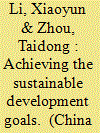

|
|
|
|
|
| Summary/Abstract |
Development became a G20 priority under the Korean presidency in 2010 and has remained central to global summitry ever since. Although the G20 has formally involved itself in the post-2015 process following the St. Petersburg Summit in 2013 and emphasized the Sustainable Development Goals (SDGs) as a core priority under Turkey's presidency in 2015, the UN remains the main channel for global negotiations and discussions of the post-2015 development agenda up to its approval and adoption in September 2015 and will continue to play the leading role in the follow-up implementation and tracking of SDGs. The present paper argues that as the SDGs come to dominate the agenda and action of donors and issues of financing take central stage, the G20 can play an important role in facilitating the implementation of the SDGs due to its various strengths, although it also faces serious challenges. The paper also points out that as the 2016 G20 chair, China can make great contributions in advancing the implementation of the SDGs both domestically and internationally.
|
|
|
|
|
|
|
|
|
|
|
|
|
|
|
|
| 2 |
ID:
076883
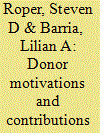

|
|
|
|
|
| Publication |
2007.
|
| Summary/Abstract |
We investigate why states provide a voluntary contribution to war crimes tribunals despite the fact that these tribunals are located in states that offer few economic and strategic advantages. We view tribunal financing as a form of foreign assistance and place the funding of tribunals within the broader foreign assistance literature to explain the motivations of donor states. We examine voluntary contributions to four tribunals, and our analysis shows that there are differences between the gatekeeper stage and the secondary decision to allocate assistance. However, donors generally make no distinction among tribunals for purposes of foreign assistance. As a consequence, purely voluntarily funded tribunals are at a disadvantage, since they are not seen by states as unique and requiring special consideration. Ultimately, the lack of funding calls into question the ability of these tribunals to provide justice to victims as well as serve as a mechanism for national reconciliation.
|
|
|
|
|
|
|
|
|
|
|
|
|
|
|
|
| 3 |
ID:
111785
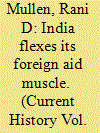

|
|
|
|
|
| Publication |
2012.
|
| Summary/Abstract |
Seeking global recognition, as well as access to resources and markets, one of the world's largest recipients of foreign assistance is boosting the aid that it distributes.
|
|
|
|
|
|
|
|
|
|
|
|
|
|
|
|
| 4 |
ID:
183784
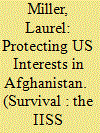

|
|
|
|
|
| Summary/Abstract |
It is unrealistic to expect the Taliban regime to provide Afghanistan with a representative government that respects human rights in line with American preferences, or to constitute a strong security partner for the United States. But Washington still has choices about the relationship it can have with Kabul. The US government should move beyond its post-withdrawal hybrid policy of isolation and limited engagement – essentially, no relationship beyond occasional ad hoc problem-solving – to one that is better able to protect US interests in the region. These include preventing Afghanistan from becoming a base for transnational terrorist groups, securing the departure of Afghans at risk due to their association with the US occupation, and tamping down anti-Western sentiment. A bilateral relationship that establishes routine US diplomatic engagement, a development-assistance programme and tailored sanctions is required.
|
|
|
|
|
|
|
|
|
|
|
|
|
|
|
|
| 5 |
ID:
170232


|
|
|
|
|
| Summary/Abstract |
There is evidence that North Korea’s ballistic missile program benefited from support from the Soviet Union until its collapse and from Russia thereafter. Along with transfers of missile systems and rocket components, it appears that Russian engineers directly supported the program in North Korea. Analysis of missile launches, imagery, design solutions, and technology suggest that Pyongyang’s recent missile program may have continued to have external support despite a pause in the 2000s. This assistance may have enabled the progress in North Korea’s missile program leading to tests of an intercontinental range ballistic missile in 2017.
|
|
|
|
|
|
|
|
|
|
|
|
|
|
|
|
| 6 |
ID:
075086
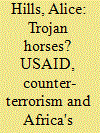

|
|
|
|
|
| Publication |
2006.
|
| Summary/Abstract |
The purpose of US foreign assistance has shifted in the wake of 2001, and Washington has resurrected practices previously associated with police aid during the Cold War. In particular, the Bush administration has broadened the remit of the United States Agency for International Development (usaid) in such a way as to make it a quasi-security agency. The consequences of this could be significant for both usaid and democratic-style police assistance programmes more generally, for today's threat-driven policies are part of a trend which in the past has had worrying consequences. Using the critical variable of public policing (which is illustrated by reference to developments in Kenya), I argue that using usaid to improve the counter-terrorist capacity of Africa's police in the pursuit of US national security objectives is a seriously flawed strategy.
|
|
|
|
|
|
|
|
|
|
|
|
|
|
|
|
| 7 |
ID:
087405
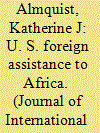

|
|
|
|
|
| Publication |
2004.
|
| Summary/Abstract |
Since 2001, the United States has dramatically increased its commited to development in Africa and has transformed tha way it is implemented. In the last eight years, U. S. foreign assistance to sub-Saharan Africa managed by the state department and the U.S. Agency for International Development (USAID) has increased by $5.5 billion, or 340 precent. An additional $3.8 billion has been provided through Millennium Challenge Account (MCA) compacts, ten of which has been signed with sub-Saharan African countries since 2004.
|
|
|
|
|
|
|
|
|
|
|
|
|
|
|
|